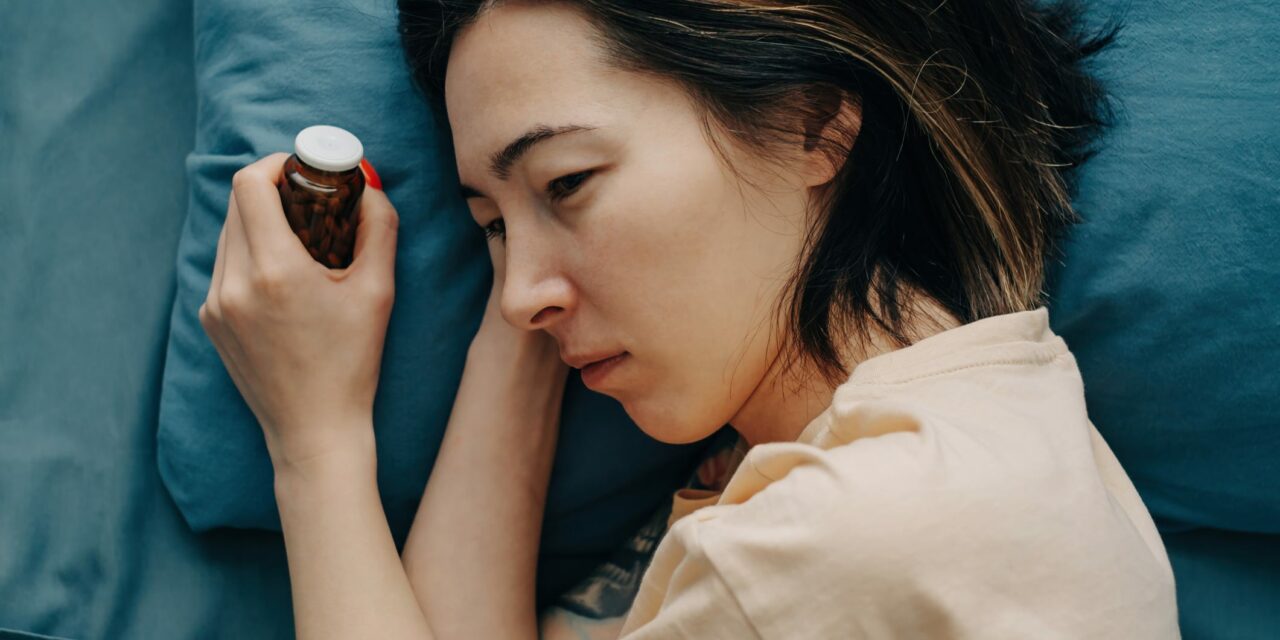The anxiety of melatonin supplement cessation can prevent patients from sleeping. Clinicians share how they’ve reduced their patients’ psychological dependence and introduced evidence-based solutions.
By Lindsey Nolen
Increasingly, adults help themselves to over-the-counter melatonin supplements as a popular but frequently misguided way to address any number of sleep woes. From 1999 to 2018, its consumption among US adults rose significantly across all demographic groups.1
But, as sleep professionals know, melatonin is not an efficacious therapy for most sleep problems or sleep disorders. When people find the supplement has not resolved their issue, they sometimes turn up at sleep specialists’ doors. Sleep specialists must then diagnose the real problem and, except in cases of specific circadian rhythm disorders,2 help the patient stop taking melatonin supplements—while also providing evidence-based therapy for their sleep issue.
Psychological Dependence on Melatonin
Clinicians say the psychological effects of melatonin cessation outweigh the physiological effects.
“The most common thing patients take melatonin for is some form of insomnia. It’s either going to get better on its own or not, but melatonin is not going to help,” says clinical psychologist Jared Minkel, PhD, an adjunct professor of psychology at the University of Rhode Island. “Almost always, if I’m treating somebody for insomnia, I try to help them get off melatonin because it’s just not strong enough to be worth taking….It’s usually just a crutch, and they feel a lot better once they know they can sleep without it.”
Echoing this sentiment, Jennifer L. Martin, PhD, professor of medicine at the University of California, Los Angeles emphasizes the challenges patients face. “Patients need to understand that, first, it’s not easy to stop taking sleeping pills of any kind. Number two, go slowly,” says Martin. “The third thing I would suggest is to be aware that it’s not a physical addiction. It’s a mental addiction, and [patients] have to be prepared to change a habit that, in some cases, they have relied on for a very long time in order to fall asleep.
“We refer to this as psychological dependence as opposed to when someone is using a drug where their body habituates or adapts to the amount that they’re taking. So when we think of somebody who wants to stop taking melatonin, we handle it in a little bit different way because not taking it causes their anxiety level to go up, and then that actually keeps them awake.”
How to Stop Melatonin Use
So, what is the best way to discontinue melatonin supplements?
Since there is no physical dependency or withdrawal, patients can safely stop melatonin immediately, without tapering, Minkel says.
But to manage anxiety, “I’ll have them take a slightly lower dose on one night and then go right back up to their full dose the next night,” he says. It can comfort patients to know they will revert to their full dose the following day. When they realize they are sleeping the same whether they take it or not, their confidence will rise, leading to melatonin cessation, he says.
Clinical sleep psychologist Deirdre Conroy, PhD, often suggests her patients taper off melatonin in one of two ways: either by reducing the dose by a specified amount at set intervals (for example, every two weeks) or by pre-selecting nights they will not take the supplement.
“By choosing the nights they will not take the medication in advance, this may show the patient that on those nights without the medication they could fall asleep easier than they may have anticipated,” says Conroy, a clinical professor of psychiatry at the University of Michigan Behavioral Sleep Medicine Clinic. “It also may lessen the belief that they only can sleep with the medication.”
Martin suggests patients follow a schedule where they lower the dose slowly. Once they’re on a very low dose, they decrease the number of nights they’re taking melatonin. Patients should keep a journal to more clearly identify when their sleep patterns are identical with and without melatonin.
Unfortunately, patients and clinicians can have trouble finding low doses of over-the-counter melatonin, particularly 1 mg and lower doses (3 mg to 10 mg doses are readily available commercially). But patients should not cut melatonin supplements in half, according to Martin, as it could lead to inconsistent dosing.
Pulmonologist-sleep specialist Muhammad A. Rishi, MD, MBBS, who practices at Indiana University Health, says two USP-verified manufacturers that offer smaller doses of melatonin are NatureMade and Natrol. At press time, Sleep Review editors found the lowest dose of melatonin in Natrol’s Kids Sleep+ Calm Strawberry Gummies, which lists 0.5 mg of melatonin as an ingredient.
Evidence-Based Therapies for Insomnia
Rishi and other clinicians note that the American Academy of Sleep Medicine guideline on the pharmacologic treatment of chronic insomnia in adults says melatonin should not be used for this indication.
Instead, cognitive behavioral therapy for insomnia (CBT-I) should be first-line therapy. Ideally, insomnia patients receive CBT-I before they start any sleep medications, but, as Minkel observes, that rarely happens due to the ease of acquiring melatonin versus finding a qualified professional to administer CBT. So instead, he keeps patients stable on the supplements they are taking while beginning CBT-I, incorporating both simultaneously.
“As their sleep improves a lot, they can’t possibly attribute it to medication because they were on that before. So they get way better on CBT for insomnia, and then it’s time to start tapering,” Minkel says. “Once we’re tapering, we’ll begin treating their anxiety related to tapering off in a systematic way so the client is involved, resulting in them being able to come off a medication like melatonin pretty quickly.”
Adam Bramoweth, PhD, DBSM, a research health scientist and staff psychologist at the VA Pittsburgh Healthcare System, also notes that CBT-I with medication tapering is supported by evidence. In particular, he cites a narrative review on the effect of CBT-I on sedative-hypnotic use, which found that “interventions including therapist-administered/supported session-based programs and interactive digital multi-component CBTi programs appear to facilitate sedative-hypnotic cessation.”5
In addition to these methods, Ambrosio Romero, MD, with online mental health provider MEDvidi.com (which offers video-based insomnia therapy), suggests that those attempting melatonin cessation should also consider creating a relaxing bedtime routine. That could include taking a warm bath, reading a book, or listening to calming music. They should avoid blue-light emitting devices, such as TVs and smartphones, an hour before bed. “Make sure your bedroom is dark, quiet, and cool; 65 to 70 degrees Fahrenheit is ideal for sleep,” Romero says he tells patients. “Regular exercise will help to improve your sleep quality. Avoid exercising too close to bedtime, which can make it harder to fall asleep.”
People don’t have to be in a “huge hurry” to stop using melatonin, Minkel says. “Sometimes people are in a rush to get off of any pill, including melatonin, and then they kind of freak themselves out and end up on it longer. It’s probably not hurting them, so they can take it. Take it slow, and just determine a rate that feels comfortable to them.”
References
1. Li J, Somers VK, Xu H, Lopez-Jimenez F, Covassin N. Trends in use of melatonin supplements among US adults, 1999-2018. JAMA. 2022;327(5):483–5.
2. Morgenthaler TI, Lee-Chiong T, Alessi C, et al. Standards of practice committee of the American Academy of Sleep Medicine. Practice parameters for the clinical evaluation and treatment of circadian rhythm sleep disorders. An American Academy of Sleep Medicine report. Sleep. 2007 Nov;30(11):1445-59.
3. Sateia MJ, Buysse DJ, Krystal AD, et al. Clinical practice guideline for the pharmacologic treatment of chronic insomnia in adults: An American Academy of Sleep Medicine clinical practice guideline. J Clin Sleep Med. 2017 Feb 15;13(2):307-49.
4. Edinger JD, Arnedt JT, Bertisch SM, et al. Behavioral and psychological treatments for chronic insomnia disorder in adults: an American Academy of Sleep Medicine clinical practice guideline. J Clin Sleep Med. 2021 Feb 1;17(2):255-62.
5. Sweetman A, Putland S, Lack L, et al. The effect of cognitive behavioural therapy for insomnia on sedative-hypnotic use: A narrative review. Sleep Med Rev. 2021 Apr;56:101404.
Photo 241480908 © Alexey Poprotskiy | Dreamstime.com




